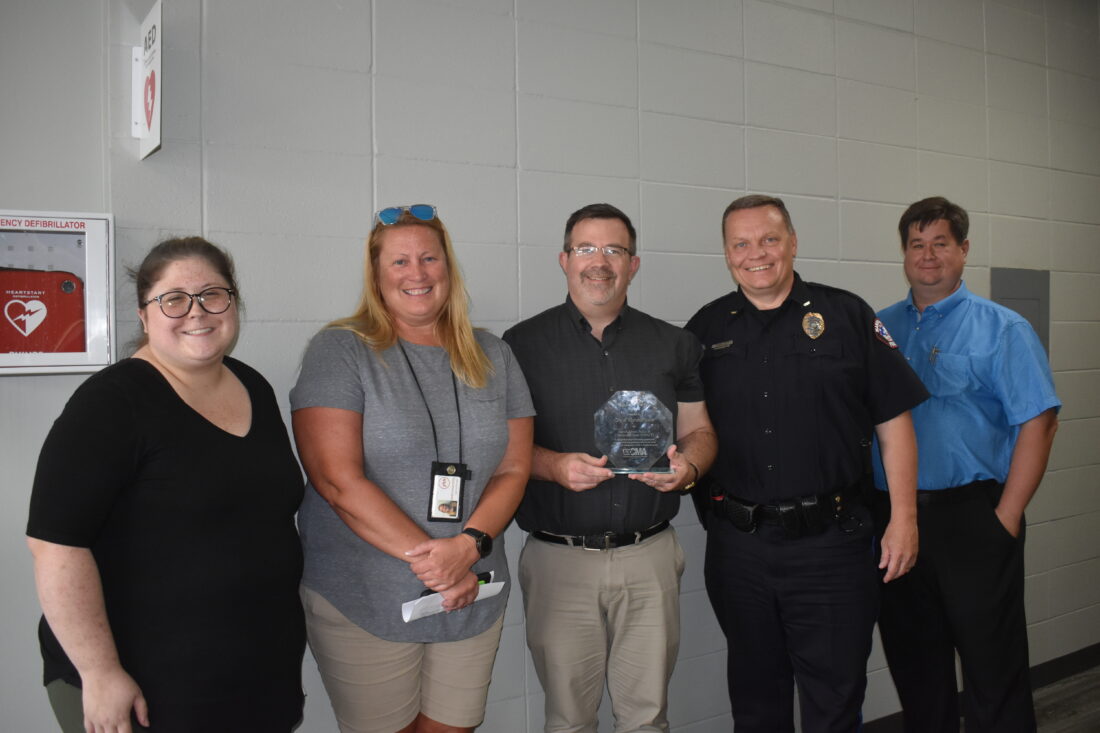PROGRESS 2022: MPACT finding its ‘secret sauce’

T-R PHOTO BY JOE FISHER — MPACT Community Advocates Autumn Drewelow and Darcy Andersen, YSS Director David Hicks, Police Chief Mike Tupper and Program Director Ryan Keller receive the Program of the Year Award.
The Marshalltown Police and Community Team has built a solid reputation in less than two years since its launch.
Communities around the state have taken notice of what is happening in Marshalltown: a unique pairing between social workers and the police department. The result is social workers, known as community advocates, meeting people where they are in their time of need, providing a path forward and directing people and families to resources which can help them with whatever they are facing including therapy, assistance programs and much more.
Another product of the program is allowing police officers to return to the field and respond to other calls. According to David Hicks, Director of Community Engagement for YSS of Marshall County, officers leave the site of an MPACT call after initial contact about 84 percent of the time. After the initial response from the community advocates, people can contact them directly for follow ups.
Between January and May of this year, community advocates have held 182 follow-up visits with 359 people. About 94 percent of callers have been willing to speak with the advocates when they first arrive.
“We realized probably halfway through last year that follow-up services were really going to be the secret sauce to this whole thing,” Hicks said. “Those are preventing calls to the police, going to the ER and it’s just providing services to the right people at the right time.”
MPACT launched as a pilot program with advocates Autumn Drewelow and Darcy Andersen going on-call in February 2021. There was not a framework or prototype in place. It was built from scratch with the backing of the city and the vocal support of YSS and Police Chief Mike Tupper, and from there, it has been a learning experience for all involved.
Drewelow, a Marshalltown native, learned a lot about the place where she grew up since returning to serve as a community advocate.
“Marshalltown is blessed in a way that not a lot of places are in terms of the community’s willingness to band together and try to support each other,” she said. “Community involvement is really emphasized, and it extends to helping people.”
To provide that help, Drewelow and MPACT have built or reignited a network of local agencies geared toward providing a variety of services to people in need. As those connections have strengthened, she has figured out how to get people connected to the services they need as quickly as possible.
“If I’m going out to a certain type of call, that contact in my phone might get a call sooner rather than later to expedite that process,” she said. “Even that is evolving. “We have revived different groups within the community that hadn’t been there prior or existed prior and went away. These agencies I’ve come to know through my childhood and upbringing had so much more to offer than what I thought.”
MPACT was named Program of the Year by the Iowa City/County Management Association just six months after kicking off as a pilot program in 2021. The strong impression it has made on the community has gone beyond city limits, turning heads at the Capitol building and securing a $200,000 federal grant from the COPS Office — Department of Justice Crisis Intervention Team Grant program.
The city also pledged $400,000 to keep the program funded through 2026. Still, MPACT needs more help if it is going to grow in the future.
Currently, MPACT includes two community advocates who respond to calls with the police department between 2 p.m. and midnight. One of the founding advocates, Darcy Andersen, relocated out of state, leaving her position vacant, so a new hire is expected to come onboard soon. Hicks, Tupper and Drewelow all agree, however, that a third and possible fourth advocate are needed.
“My next goal with the program is to find a way to expand the hours,” Tupper said. “We would like to expand to cover our peak call times. Peak hours are noon to 2 or 3 a.m.”
To hire more advocates, the program needs more funding. Otherwise, the date where current funding runs out draws closer and closer.
More funding could do more than pay for additional advocates and expand hours, according to Hicks. Mental health issues comprise about half of MPACT’s calls, but another large issue facing Marshalltown is homelessness.
MPACT is currently unable to provide temporary stays in local hotels for people who find themselves without shelter, even for one cold winter’s evening.
“If we encounter a family living in their car and the weather is terrible, we don’t have the funding to put them in a hotel overnight,” Hicks said. “Some of those immediate funding needs like shelter, food and consumables — again, this is certainly an opportunity for the public to help us.”
Drewelow agrees homelessnes is the most difficult situation to address right now.
“It’s disheartening when you don’t have an answer for these people who deserve some semblance of peace,” she said. “We’ll need extra support and extra resources to meet those needs as much as we should be meeting them.”
